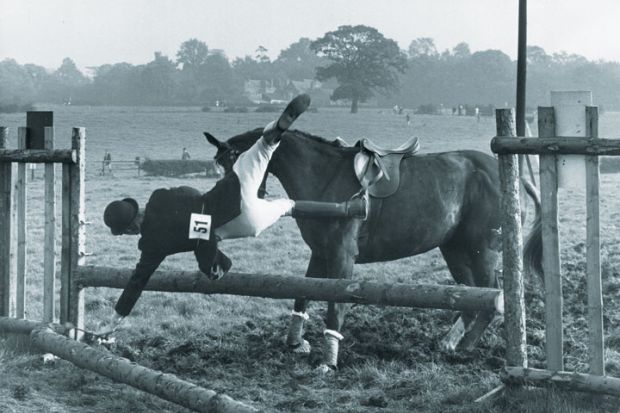Questions have been raised about UK research councils allowing grant applications from overseas universities after it emerged that just 3 per cent of such bids were successful.
UK Research and Innovation (UKRI) data for six research councils indicate that some 78 non-UK universities made a total of 101 applications for open-call funding in 2018-19, but just three projects won backing. Overall, £1.1 million was awarded to projects after institutions bid for £38 million of funding.
In contrast, the overall success rate for the six main UK research councils for universities was 27.4 per cent.
The highest overall success rate was found at the Economic and Social Research Council, where 31.6 per cent of grant and fellowship applications were funded. The lowest success rate was at the Medical Research Council, where 22.3 per cent of bids were accepted. Overall, some £1.6 billion was distributed by the six councils in 2018-19, of which £163.3 million was funding for fellowships.
The low success rates for those foreign university candidates are likely to prompt questions about their involvement in UK research council funding. Most councils do not allow foreign-based principal investigators to seek funding, but exceptions can be made, Times Higher Education understands.
Of the three overseas universities to win research council funds, the American University of Beirut received a £780,000 grant to investigate the integration of refugees into national health systems, while Makerere University in Uganda won £199,000 for a project on data science and health, and Tanzania’s Muhimbili University of Health and Allied Sciences was awarded £202,000 to study antimicrobial resistance.
Non-UK universities that partner with UK universities are able to receive support via the Global Challenges Research Fund, which was established in 2015 with an initial five-year budget of £1.5 billion to “support cutting-edge research that addresses the challenges faced by developing countries”.
However, while most institutions that applied directly for grants came from Africa or South-east Asia, many were from affluent countries – with applications made by Stockholm, Gothenburg and Lund universities, in Sweden, the University of Sydney and Tokyo International University.
Jude Fransman, co-convener of the Rethinking Research Collaborative and a research fellow at the Open University, said the low success rate should raise questions about “why applications from certain profiles of researcher in certain types of institution in certain parts of the world will always be less competitive”.
“To redress this, we need to think beyond individual funding applications to the broader funding system and look at composition of strategic agenda-setting committees,” Dr Fransman said. “We also need to look at partnerships between UKRI and southern funders such as the African Academy of Sciences to ask whether the agendas being set for UK science have relevance for African needs and priorities as well,” she added.
However, Dr Fransman cautioned against the notion that low success rates were necessarily an indication of poor academic practice.
“Unsuccessful applications don’t have to be a waste of time if application development itself is funded with the purpose of either establishing new research agendas, building networks or analysing implementation contexts,” said Dr Fransman. “We have to be careful that this quest for efficiency doesn’t close down critical thinking time.”
jack.grove@timeshighereducation.com
Showstoppers: UK research council grants 2018-19
|
Research |
Applications |
Awards |
Success |
Total awarded (£000s) |
|
Arts and Humanities Research Council |
837 |
259 |
30.9 |
102,557 |
|
Biotechnology and Biological Sciences Research Council |
1,741 |
457 |
26.2 |
209,141 |
|
Economic and Social Research Council |
1,377 |
435 |
31.6 |
201,211 |
|
Engineering and Physical Sciences Research Council |
2,636 |
742 |
28.1 |
658,875 |
|
Medical Research Council |
1,823 |
406 |
22.3 |
307,441 |
|
Natural Environment Research Council |
1,354 |
374 |
27.6 |
135,683 |
|
Total |
9,768 |
2,673 |
27.4 |
1,614,908 |
|
Source: UKRI. Success rate is by number of applications. Some specialist, non-academic and overseas recipients have been excluded, hence figures may be different from those provided by UKRI. Awards from Innovate UK, Research England and the Science and Technology Facilities Council have not been considered. |
UK universities: who were the big research fund winners?
UCL was the biggest recipient of UK research council funding in 2018-19, winning £139.9 million in competitive grants and fellowships from the six research councils – with an overall success rate of 30.9 per cent, slightly ahead of the UK average of 27.4 per cent.
It was followed by Imperial College London, which claimed £80.3 million at a 25.3 per cent hit rate, with the University of Edinburgh close behind on £79.8 million, thanks to a 31.2 per cent overall success rate. The universities of Oxford and Cambridge attracted £78.6 million and £71.2 million of open-call funding, respectively, with success rates of 29.8 per cent and 29.2 per cent.
Swansea University won the most competitive research funding of any non-Russell Group university, collecting £57.7 million at a 22.1 per cent success rate, of which £51.6 million came from the Engineering and Physical Sciences Research Council. Its ninth-placed position in overall funding put it ahead of several Russell Group universities, including the University of Bristol (£52.6 million), King’s College London (£51 million) and the University of Glasgow (£49 million).
Overall, the Russell Group’s 24 research-intensive universities won £1.17 billion of competitive grant and fellowship funding – about 73 per cent of the £1.6 billion awarded to universities in 2018-19.
However, several universities outside the Russell Group enjoyed strong success rates, analysis shows. Of those universities that submitted at least 50 grant or fellowship applications, Loughborough University enjoyed the highest hit rate (34.7 per cent), while Royal Holloway, University of London had a 33.3 per cent success rate – the fourth highest of any UK university – and the University of Sussex had a 31.1 per cent hit rate.
后记
Print headline: Overseas bids fall well short in race for UK grants




